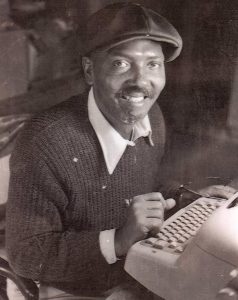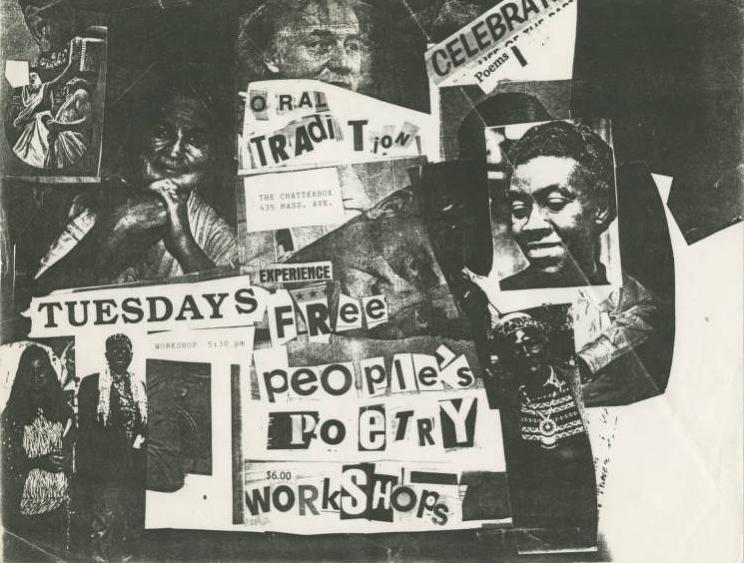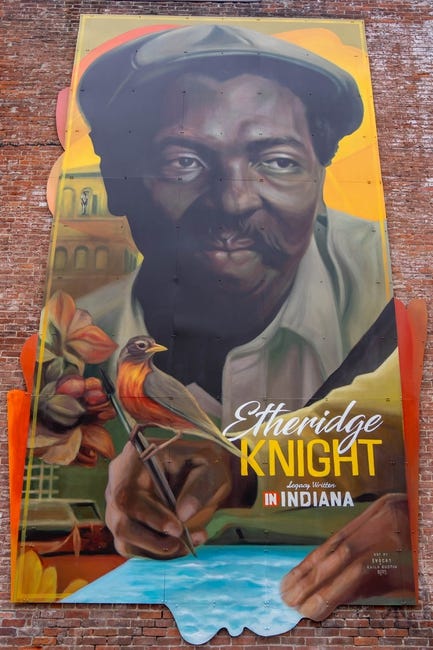
Photo info …
Credit: Indiana Historical SocietyView Source
(Apr. 19, 1931-Mar. 10, 1991). Born in Corinth, Mississippi, Etheridge Knight was the son of Belzora Cozart Knight and Etheridge (Bushie) Knight. He was an off-and-on resident of Indianapolis from the 1950s until his death.
When he was young, Knight moved with his parents to Paducah, Kentucky, where his father worked as a laborer on the Kentucky Dam, a hydroelectric dam that was built in the 1930s and early 1940s as a TVA project. As a teenager, he frequently ran away from home. His parents, therefore, sent him back to Corinth where he lived with an uncle. Knight dropped out of school when he was 16 and first worked as a shoeshiner in a small Kentucky town. He also spent much time in pool halls, juke joints, and underground poker games. He later stated that he picked up many nuances of language by listening to toasts—an oral tradition of narrative-style poetry—in these environments.
In 1947, Knight enlisted in the U.S. Army, serving as a medical technician in the Korean War. He became addicted to opiates after suffering a severe shrapnel wound during the conflict. Discharged from the Army in 1950, Knight moved to Indianapolis, where his family had relocated. He spent much of the next several years stealing to support his drug habit and was arrested for armed robbery in 1960. Knight began writing while incarcerated in the Indiana State Prison, observing, “I died in Korea from a shrapnel wound and narcotics resurrected me. I died in 1960 from a prison sentence and poetry brought me back to life.”
Poets Gwendolyn Brooks and Dudley Randall encouraged Knight’s early work. His 30-page chapbook, , was published in 1968 by Randall’s Broadside Press, established by Randall to make the works of African Americans available and at affordable prices. Knight edited the work of other prisoners in (1970).
Black Voices reflected Knight’s career-long concern with prisoners’ poetry and the idea of poets forming a community. He conducted three Free People’s Poetry Workshops in Indianapolis (the first in the early 1970s, the last from 1989 until his death) and began other Free People’s Workshops in Boston, Memphis, Philadelphia, and elsewhere. In 1990 he served as a visiting writer in the .

Knight also served as poet-in-residence at the University of Pittsburgh, Lincoln University, and the University of Hartford and worked with the Writer’s Studio in 1990. He was named the poet laureate of Indianapolis’ and in 1990 was awarded a B.A. degree from that institution.
Knight won fellowships from the National Endowment for the Arts and the Guggenheim Foundation and received the Shelley Memorial Award from the Poetry Society of America in 1985. (1986) earned him the 1986 Before Columbus American Book Award, which recognizes outstanding achievement across a diverse spectrum of the American literary community. Knight’s other books of poems are: (1973) and (1980).

Knight’s poems have often been anthologized, notably “Hard Rock Returns to Prison from the Hospital for the Criminally Insane,” “The Idea of Ancestry,” and “For Black Poets Who Think of Suicide.” Knight was recognized for his performance of poetry and his belief that poetry was essentially an oral art. As Brooks wrote in her preface to , “Since Etheridge Knight is not your stifled artiste, there is air in these poems. And there is blackness, inclusive, possessed and given; freed and terrible and beautiful.”
The Etheridge Knight Festival of the Arts began in Indianapolis in 1992 by Eunice Knight-Bowens as a tribute to her brother. The festival brought together national and local individuals who performed and also served as mentors to emerging artists. Knight was posthumously awarded a Governor’s Arts Award by the in 1993.
The annual Etheridge Knight Festival added a youth poetry program in 1994. In 2012, it hosted nationally recognized African American poets Amiri Baraka, , Haki Madhubuti, and Sonia Sanchez. This “Evening with the Legends” also paid homage to Gwendolyn Brooks (1917-2000). The festival was discontinued after this celebration.
Knight was memorialized in 2023, when South Florida-based artist Elio Mercado and Indianapolis artist Kaila Austin painted a 2-story mural of Knight on the north wall of the on .

Help improve this entry
Contribute information, offer corrections, suggest images.
You can also recommend new entries related to this topic.

